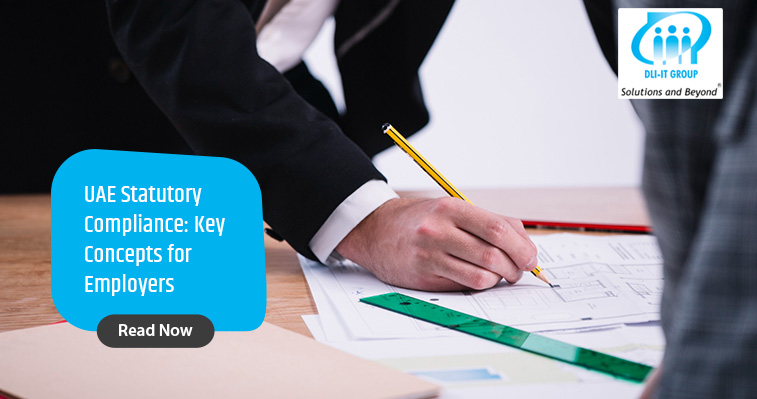The dynamic nature of UAE business operations requires employers to follow statutory requirements to protect their legal position and create positive workplace environments. Employers need to follow particular regulations that enable operational efficiency while preventing penalties and supporting employee welfare. This blog provides essential information about UAE statutory compliance requirements which employers can apply directly to their operations.
What is Statutory Compliance?
The UAE requires businesses to comply with all legal framework regulations that encompass labor laws, tax regulations, and safety requirements. The legal framework has established proper guidelines which protect employment fairness as well as taxation and workplace safety thus creating an environment of stability for employers and staff members.
What role does statutory compliance play in the UAE business environment?
- Legal Safety protects businesses by shielding them from legal actions, license suspension, and financial penalties.
- Employee Satisfaction: Ensures fair treatment and a supportive work environment.
- Business Reputation: Builds trust with employees, clients, and stakeholders.
- The adherence to local regulations through operational efficiency helps organizations prevent operational interruptions.
Employers in the UAE must follow specific mandatory regulations which include
-
Payroll and Wages:
The UAE Wage Protection System (WPS) mandates timely and accurate payment of employee salaries.
Key considerations include:
- WPS Registration requires employers to follow WPS requirements in their payroll procedures.
- End-of-Service Benefits (EOSB): Calculating gratuity payments in line with UAE labor laws.
- OT Pay: Employers must pay employees overtime wages according to legal requirements.
-
Labor Law Compliance
Worker-employer relations in the UAE fall under the jurisdiction of the UAE Labor Law.
Critical areas include:
- Employment Contracts need to follow UAE legal requirements when businesses draft them.
- The rules regarding working hours, annual leave, and weekly rest days must be followed by all employees.
- Termination Regulations: Managing terminations and layoffs in compliance with the law.
-
Health, Safety, and Welfare
The workplace safety responsibility of employers includes meeting both local regulations and providing a safe environment.
- The workplace needs to implement safety protocols and training programs as part of occupational safety measures.
- Health Insurance: Offering mandatory health insurance to all employees.
- Workplace Facilities: Maintaining adequate facilities for employee welfare.
-
Employee Benefits
The provision of employee satisfaction benefits falls under statutory compliance requirements.
- The company provides three types of paid leave entitlements that include annual leave, sick leave, and maternity leave.
- The process of end-of-service benefit calculation and distribution requires accurate methods.
-
Visa and Immigration Compliance
All employers in the UAE must follow the rules of immigration law which include:
- Employers must obtain valid work permits for their staff members.
- Residency Visas: Ensuring timely renewals of employee visas.
- Emiratization Policies: Meeting quotas for hiring UAE nationals, where applicable.
Consequences of Non-Compliance in the UAE
A failure to meet statutory requirements leads to multiple negative outcomes that include:
- Hefty fines and penalties. Business licenses may face suspension or termination as one of the consequences for non-compliance in the UAE.
- Legal disputes and reputational damage.
- Reduced employee trust and morale.
Best Practices for UAE Employers
- Employers in the UAE must review labor and business laws for updates regularly.
- The HR WORKS software serves as an ideal tool for UAE employers to streamline their compliance management operations.
- Legal experts together with human resource professionals should be consulted to provide guidance.
- Employee Awareness: Educate employees about their rights and workplace policies.
- Organizations should execute periodic audits that help find and resolve compliance gaps.
How DLI-IT Group Can Help
Statutory compliance in the UAE presents challenges which the appropriate technological solutions help organizations manage effectively. The HR WORKS software from DLI-IT Group delivers UAE-specific solutions that manage payroll procedures as well as time attendance and compliance requirements. Employers can concentrate on business expansion through the use of advanced tools that maintain statutory compliance. Business success in the UAE depends on meeting all mandatory legal requirements.
The implementation of legal requirements by employers protects their operations at the same time that it drives staff satisfaction levels while constructing organizational reputation.
